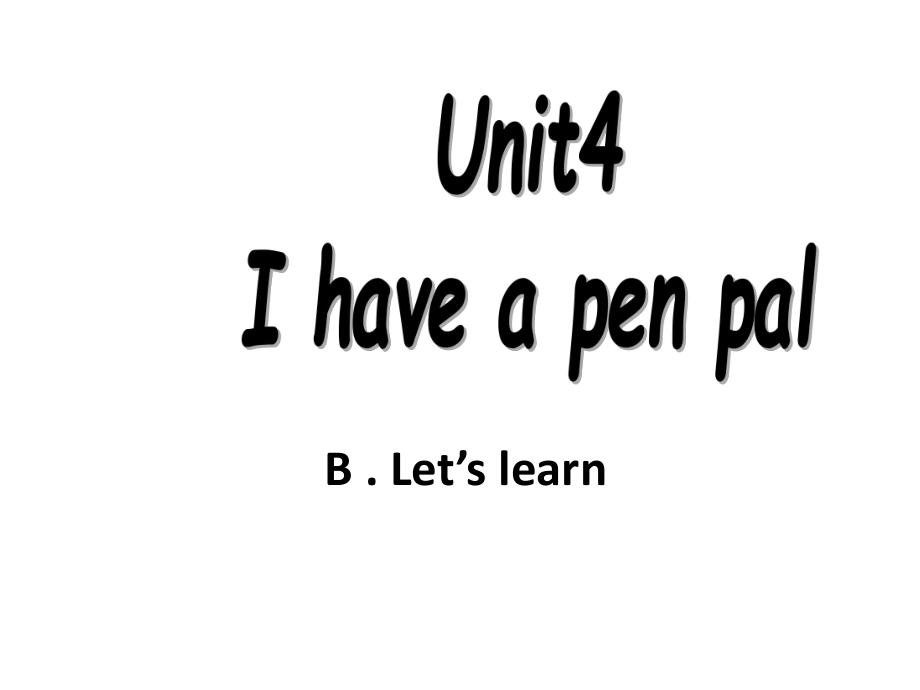《人教PEP版英語(yǔ)六上Unit 4 I Hav a Pen Palppt課件1》由會(huì)員分享��,可在線閱讀��,更多相關(guān)《人教PEP版英語(yǔ)六上Unit 4 I Hav a Pen Palppt課件1(29頁(yè)珍藏版)》請(qǐng)?jiān)谘b配圖網(wǎng)上搜索��。
1��、B . Lets learnWhats your hobby ? 你的愛(ài)好是什么�����?你的愛(ài)好是什么��?I like . 我喜歡我喜歡.�。divingmaking kitesplaying the violinriding a bike collecting stamps我喜歡騎自行車。他喜歡騎自行車����。I like riding a bike.He likes riding a bike.翻譯:I like riding a bike.He likes riding a bike.比較:動(dòng)詞原形動(dòng)詞第三人稱單數(shù)形式 livelives(居住,?�。ň幼?����,住) teachteaches(教)(教) g
2����、ogoes(去)(去) watchwatches(看)(看) readreads ( 讀����,看讀,看)常見的三人稱單數(shù)形式的變化常見的三人稱單數(shù)形式的變化觀察并總結(jié):觀察并總結(jié):1.I like collecting stamps.2.He likes collecting stamps.3.Chen Dongshen likes collecting stamps.4.My pen pal likes collecting stamps.什么時(shí)候用動(dòng)詞三單形式�?句子主語(yǔ)是第三人稱單數(shù),句子主語(yǔ)是第三人稱單數(shù)����,動(dòng)詞用第三人稱單數(shù)形式。動(dòng)詞用第三人稱單數(shù)形式���。Mr. BlackBeijinggog
3�����、oeses to work to work watchwatcheses TV at night TV at night readreads s newspapers every newspapers every day day I teach English. Does he teach English ? No, he doesnt. He teaches Math.Mr. ChenDoes he teach Math ? Yes , he does .Does he teach English ?No ,he doesnt .變?yōu)橐话阋蓡?wèn)句�����,借用助動(dòng)詞變?yōu)橐话阋蓡?wèn)句��,借用助動(dòng)詞does.
4�、借用借用does之后動(dòng)詞還原為原形。之后動(dòng)詞還原為原形����。仿照例子寫句子:仿照例子寫句子:例子: teach EnglishHe teaches English. Does he teach English? Yes, he does. No, he doesnt.1.go to work by bus2.watch TV3. read newspapers everyday4. go to work at 10總結(jié):Does 主語(yǔ)主語(yǔ) 動(dòng)詞原形其他?動(dòng)詞原形其他�?肯定回答:肯定回答:Yes, he she does.否定回答:否定回答:No, he she doesnt.read read l
5、ook look work work say say run run go go do do watch watch teach teach have have 一般現(xiàn)在時(shí)動(dòng)詞第三人稱一般現(xiàn)在時(shí)動(dòng)詞第三人稱單數(shù)的變化規(guī)則單數(shù)的變化規(guī)則1. 1. 一般情況下����,動(dòng)詞后一般情況下,動(dòng)詞后直接加直接加s.s.EgEg:workworks, s, getgets, s, readreads s等等. .2. 2. 以以s s�,x x,chch��,shsh或或o o結(jié)結(jié)尾的動(dòng)詞����,在后面加尾的動(dòng)詞,在后面加esesEgEg:gogoes, es, teachteaches, es, watchwatchese
6��、s等�。等。動(dòng)詞動(dòng)詞havehave遇在主語(yǔ)是第三遇在主語(yǔ)是第三人稱單數(shù)時(shí),人稱單數(shù)時(shí)�,havehave改為改為hashas,如:��,如:He He hashas an an interesting book . interesting book . 寫出下列動(dòng)詞的第 三 人稱單數(shù)形式 read reads s look looks s workworks s say says srunruns sgogoesesdodoeseswatchwatchesesteachteacheseshashasB . Lets talkMy mother is a teacher. Does she teach
7��、 English?No, she doesn t . She teaches math.Does she teach you math?Yes, she does. Zhang:Sarah: Zhang:Sarah: Zhang:GOODBYE! Alice is my new friend. She lives in Australia. Her father works in a school. He is a teacher. He goes to work by bus. Her mother is a nurse. She works in a hospital. She goes
8����、to work by car. Alice and her sister are twins. They look the same, but they are very different. Every morning, Alice goes to school by bike, but Ann goes to school on foot. Every evening, Alice reads newspapers. Her sister Ann watches cartoons on TV. Alice usually plays at the park on Saturdays. An
9�、n usually makes kites. I write an email to Alice every week. Alice says her family is coming to China soon. I am excited. Tips1: Tips1: 看看課文。找出并用橫線劃出新單詞���。課文���。找出并用橫線劃出新單詞。 live in Australia 居住在澳大利亞居住在澳大利亞work in a school 在學(xué)校工作在學(xué)校工作look the same看起來(lái)一樣看起來(lái)一樣different 不同的不同的every morning / week 每天早上每天早上/星期星
10���、期watch cartoons on TV 看卡通片看卡通片write an email 寫一個(gè)郵件寫一個(gè)郵件says 說(shuō)說(shuō)soon 不久不久excited 興奮的��;激動(dòng)的興奮的��;激動(dòng)的Tips2:分段讀�,抓住關(guān)鍵詞。分段讀��,抓住關(guān)鍵詞�。利用關(guān)鍵詞復(fù)述課文。利用關(guān)鍵詞復(fù)述課文�。Alice is my _. She _ in Australia.Her father _ in a school. He is a _.He _ to work _ bus.Her mother is a nurse. She works in a _ .She goes to _by car.Alice and h
11、er sister are _. They _the same,but they are different. I write _Email _ Alice every week.Alice says her family is _ to China. I am _.friendlivesworksteachergoesbyhospitalworktwinslookantocomingexcited 1.Does Alice go to school by bus? . 2.Does her father work in a hospital .3.Does he go to work by bus? . 4.Does Ann go to school by bike? . 5.Does Alice read newspapers every evening? .No, she doesntNo, she doesntNo, she doesntYes, he doesYes, she doesShe goes to school by bike.Her father works in a school.Ann goes to school on foot.1��、讀練習(xí)冊(cè)目標(biāo)點(diǎn)擊部�、讀練習(xí)冊(cè)目標(biāo)點(diǎn)擊部分。分�����。 2��、練習(xí)冊(cè)��、練習(xí)冊(cè)47-48�����,��。
 人教PEP版英語(yǔ)六上Unit 4 I Hav a Pen Palppt課件1
人教PEP版英語(yǔ)六上Unit 4 I Hav a Pen Palppt課件1

